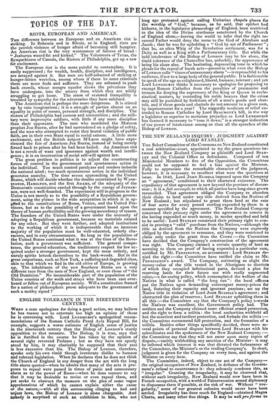TOPICS OF THE DAY.
RIOTS, EUROPEAN AND AMERICAN.
THE difference between an European and an American riot is striking. In Bohemia and in Silesia, as in England, riots are the peevish violence of hunger afraid of becoming still hungrier. An American riot is the very wantonness of fulness of bread : " Jeshurun waxed fat and kicked." The Volunteers of Texas, the Sympathizers of Canada, the Rioters of Philadelphia, get up a row for excitement.
The European riot is the more painful to contemplate. It is easily suppressed ; for wealth, health, discipline, and intelligence, are arrayed against it. But men are half-ashamed of striking at hunger-bitten wretches, among whom if there be some criminals there are more fools and sufferers. They are ashamed to push back crowds, whose meagre squalor shows the privations they have undergone, into the misery from which they are wildly struggling to get loose. The sense of restored tranquillity is troubled by sympathy for the adversaries they have subdued. The American riot is perhaps the more dangerous. It is stirred up by vain imaginations ; it is a struggle of parties almost on an equality in point of means, personal strength, and discipline. The rioters of Philadelphia had cannon and ammunition ; and the mili- tary were impromptu soldiers, with little if any more discipline than their opponents. The men who murdered the Mormon prophet JOE SMITH, after he had surrendered on a pledge of safety, and the men who attempted to resist that brutal violation of public faith, are in their own State equal in social esteem. A little more excitement, and the British subject APLEon might have expe- rienced the fate of American JOE SMITH, instead of being merely forced back to prison after he had been bailed. An American riot is not a revolt of want and ignorance against wealth and intelli- gence ; it is an insurrection of social self-will against law.
The great problem in politics is to adjust the counteracting forces of control in the government and spontaneous action in the individual. Too much control paralyzes and renders imbecile the national mind ; too much spontaneous action in the individual generates anarchy. The time seems approaching in the United States, which will decide whether the doubts entertained by WASH- INGTON, HAMILTON, and the first ADAMS, of the adequacy of the Democratic constitution carried through by the energy of JEFFER- SON, were not well-founded. The experiment still in progress in the Union is not merely as to the possibility of a Republican govern- ment, using the phrase in the wide acceptation in which it is ap- plied to the constitutions of Rome, Venice, and the United Pro- vinces, but as to the possibility of a government based upon the theory of human perfectibility and the growing ascendancy of reason. The founders of the United States were under the necessity of adopting a Republican government, because no materials existed for any other. But they went further, and adopted institutions to the working of which it is indispensable that an immense majority of the population must be well-educated, orderly cha- racters, and in easy circumstances. So long as the population of the United States continued what it was at the time of the Revo- lution, such a government was sufficient. The general compe- tence, the general education, the traditionary respect for law ac- quired under a stronger government, kept the mass orderly, and unruly spirits betook themselves to the back-woods. But in the great emporiums, such as New York, a suffering and degraded class, akin to that which we find in the old cities of Europe, is growing up. The inhabitants of the new Southern States are a very different race from the men of New England, or even those of " the Old Dominion." No inconsiderable part of the population of the Union consists of the waifs and strays who have been cast over- board or fallen out of European society. Willa constitution framed for a nation of philosophers prove adequate to the government of such a motley squad ?


























 Previous page
Previous page